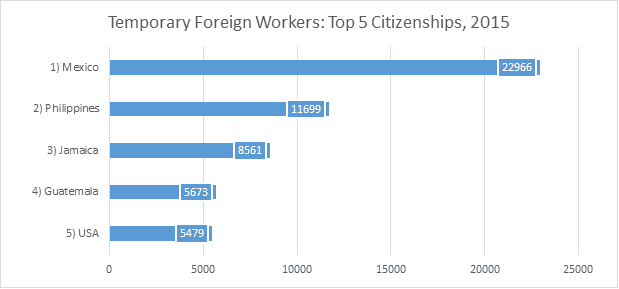Unions and employers have welcomed federal government changes to the Temporary Foreign Worker Program, abolishing the cumulative 4-year duration rule that forced many people to leave the country.
The United Food and Commercial Workers Union (UFCW), plus Canada-wide businesses in a variety of sectors, say the rule change will help improve worker rights and help companies get the staff they need to operate at full capacity.
The federal government made the announcement on Wednesday, December 15, 2016, immediately abolishing the ‘four-in, four-out’ rule, and saying more changes were coming in 2017.

Source: Immigration, Refugees and Citizenship Canada
“Our union is encouraged by the announced changes to the TFWP, and we will continue advocating for further improvements to the program and our immigration system, motivated by our belief that if you are good enough to work in Canada, you are good enough to stay,” says Paul Meinema, national president of UFCW Canada.
In Alberta, businesses including meat processing plants and hotels, say the change means they will be able to hold on to trusted members of staff, and bring back others who had to return home under the old rules.
Previously, when the four years were up, employers had to begin the process of bringing in a new TFW all over again, including applying for a Labour Market Impact Assessment (LMIA) and also training new staff members from scratch once they arrived.
Under the old rule, temporary foreign workers who had been in Canada for four years became ineligible to work here for the next four years.
Scrapping the rule is in line with Standing Committee recommendations made in September 2016 after a summer spent studying the TFWP.
Standing Committee Recommendation 18
Amend the Immigration and Refugee Protection Regulations to remove the relevant provisions with respect to the “cumulative duration” rule.
Immigration Minister John McCallum said: “In many ways, the four-year rule put a great deal of uncertainty and instability on both temporary workers and employers.
“We had the sense that it was an unnecessary burden on applicants and employers, and also on officers who process applications.
“We believe this important recommendation from the committee requires rapid action.”
When the rule was implemented in April 2011, critics said it would dramatically increase the number of undocumented immigrants in Canada.
A further impact was that some workers saw their permits expire before applications for permanent residence had been processed, leaving them stuck in limbo without the right to work.
Interested employers: Kindly contact us here to receive further information.
Interested candidates: Find out whether you qualify to Canada by completing our free on-line evaluation. We will provide you with our evaluation within 1-2 business days.
Read more news about Canada Immigration by clicking here.


